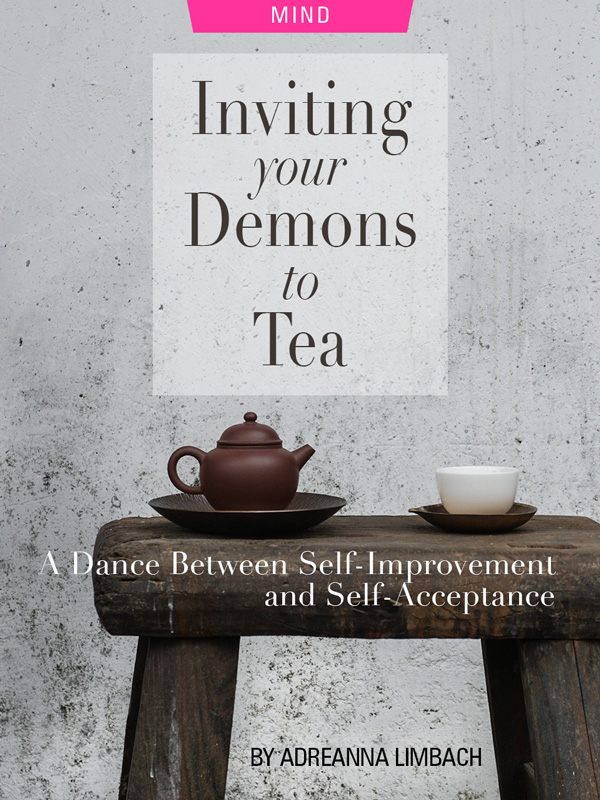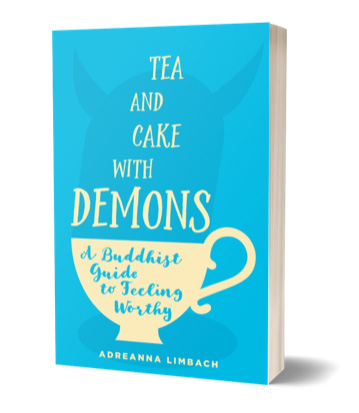
With humor and refreshing candor, one woman faces off with our desires to ‘self-help’ — offering a new twist on ‘enoughness’ and authentic self-worth
—
Around the time I realized that meditation brought me a sense of sustainable sanity and decided to quit dabbling and commit whole heartedly to my practice, I had a meeting with one of my mentors after a weekend-long retreat. We were seated at an outdoor cafe around the corner from the studio space. It was fall. We both ordered chai tea. I was feeling clear, steady, open-hearted and vulnerable after a weekend of practice. So clear and open-hearted that I decided that it was the perfect time to confess to my mentor that I was a terrible meditator and probably a horrible ‘spiritual’ person.
For one, I shared, I’m the most judgmental person that I know. I love to gossip. I’m also bossy, or I like to be the boss, which makes it very hard to collaborate with others. Also I’m a perfectionist wracked with chronic self-doubt. I have a mean girl who lives inside my head, monitoring how other people perceive me and telling me all of the ways that I’m wrong. Sure, I have some good qualities. Great qualities, even. But what should I do about the bad ones? Did she have some sage words on how to fix my gnarlier bits or how to make them go away? My mentor sipped her chai, and looked across the table from me.
“What if these aspects that you don’t like about yourself never change? Because truth be told, they may not.”
I sat there, quiet and dumbfounded. It had never occurred to me that maybe I would always be judgmental with a streak of perfectionism. A part of me might always feel like a fraud. And maybe that was okay. Maybe my work was to make friends with the dodgy bits of who I am, my demons so to speak, rather than trying to continually fix, change and improve. I figured it was at least worth a try. The perpetual pursuit of improving myself was frankly, really exhausting. So I gave self-acceptance a try.
Looking back, this conversation was an early seedling that became the roots of my new book, Tea and Cake With Demons: A Buddhist Guide to Feeling Worthy. As the name suggests, it’s an exploration of the parts of ourselves that we generally prefer not to look at: chronic self-doubt, shame, perfectionism jealously; all of the bits that we try to hide from others, or at the very least prefer not to talk about in polite company. I wanted to write a book that picked up where this conversation with my mentor left off by asking the question:
What if our nasty habits, neuroses and difficult emotions are not obstacles on our path, but rather the path itself?
Through the lens of the core Buddhist teachings of the Four Noble Truths and resulting Eight Fold Path, this book was written as a guide to finding self-acceptance and our inherent worth by creating space for our demons to be seen, understood and integrated. By inviting them in for tea.
As a meditation teacher and coach I’ve found myself having conversations about self-doubt and self-worth a lot over the past decade. There is a shelf in my office that houses nearly one hundred notebooks, all packed with the words and stories of clients (mostly women) from over a dozen countries. Regardless of their socio-economic background, age, cultural origin, religious beliefs and life experiences, there is one common thread that has remained consistent in these stories: rampant self-doubt that frequently manifests in the quiet, persistent suspicion that they are not quite ‘enough’.
Perhaps you can relate to the feeling of not being quite _____ enough. (Fill in the blank.)
Attractive enough. Productive enough. Financially or socially affluent enough. Self-doubt is always ready to point out fresh evidence of how we are falling short. A large part of inviting our demons to tea is to notice how this feeling of lack manifests for us personally. What rises to the surface in the moments when you feel the most overwhelmed and under-resourced? It might be worth closing your eyes and really feeling into this question.
What rises to the surface in the moments when you feel the most overwhelmed and under-resourced?
This is a pretty good indicator of our most prominent personal demon material. Another aspect of inviting our demons to tea is having the ability to zoom out and get a wide lens view of our cultural norms. What are the narratives that exist here? It’s no wonder that so many of us struggle with feeling ‘enough’ when we live in a society that profits from our continual scurry to acquire something better, faster, more.
Something that I’ve found personally helpful in the practice of accepting my gnarlier bits, inviting my demons to tea, is to notice where my thinking becomes rigid and binary. It’s likely that many of us default to binary thinking — again, it’s part of our cultural norm. Yes vs. No. Right vs. Wrong. For me vs. Against me. Delicious vs. Disgusting. It’s a natural human habit to classify the world by what we like and what we don’t. To judge our circumstances in a snap. To some extent this is a wonderful quality. We can judge on the binary very quickly ‘safe’ and ‘not safe’ which keeps us from walking out into traffic. However this binary thinking can very easily become the primary lens through which we see the world, including how we see ourselves. Either I am winning or I am failing. I am good or I am bad. This sets up a system of self-aggression that demonizes the aspects of ourselves that we deem to be bad, failing, wrong and in need of fixing.
The practice of inviting our demons to tea challenges us to begin shifting to a more curious, inclusive and fluid way of thinking.
We’re asked to entertain the idea that perhaps we are not an ‘either-or’ binary but rather a ‘both-and’ process. The great Zen teacher Shunryu Suzuki is rumored to have addressed a room full of his students by declaring “Each of you is perfect just the way that you are . . . and you can use a little improvement.”
It’s the recognition that we are already complete, but not finished. Whole and also developing. Enough, and also still evolving. We are the brilliant wisdom bits and the gnarlier, neurotic demon bits all rolled into one. Accepting ourselves as ‘both-and’ is the key to stepping into our wholeness, and our fundamental worth.
So what if these aspects that you don’t like about yourself never change? Because truth be told, they may not. You may always have dodgy bits. Demons. And maybe that’s okay. Maybe relaxing the urge to fix ourselves is the path to becoming really good friends with who we are. Every great fable has a fire-breathing monster that guards a vast amount of treasure. Sometimes we need a sword to defeat it. Sometimes we just invite it to have a seat at the table — and pour it a warm cup of tea.
You may also enjoy reading Amazing Grace: Experiencing the extraordinary within the ordinary by Adyashanti
